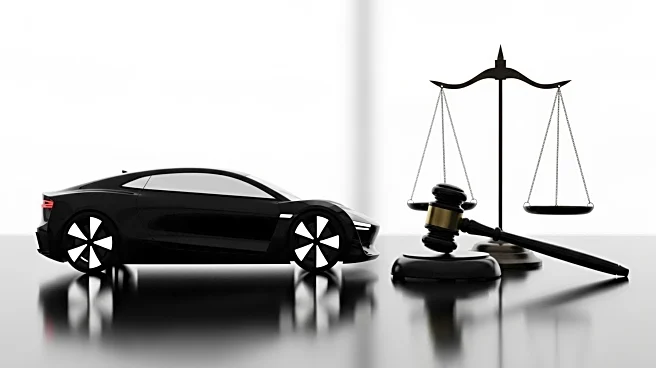What's Happening?
Tesla is appealing a $243 million jury verdict from a Miami court, which found the company 33% liable for a fatal crash involving its Autopilot technology. The case, Benavides v. Tesla, centers on a 2019 incident where driver George McGee collided with a parked vehicle while using Autopilot. The jury awarded $200 million in punitive damages, citing Tesla's alleged misrepresentation of Autopilot's capabilities, which they argued created a false sense of security among users. Tesla's appeal challenges the trial court's decision to admit public statements by Elon Musk and claims of data withholding, which the company denies. This case underscores the growing scrutiny of automakers' marketing practices and their alignment with the real-world limitations of autonomous technologies.
Why It's Important?
The verdict against Tesla highlights significant legal and reputational risks for the company, which has been a leader in autonomous vehicle technology. The case could set a precedent for shifting liability from drivers to manufacturers, even in instances of driver error. This shift could lead to increased insurance costs and regulatory demands for clearer communication about the limitations of semi-autonomous systems. For Tesla, balancing innovation with accountability is crucial to maintaining its market position. The outcome of this appeal could influence how courts and regulators approach similar cases, impacting the broader autonomous vehicle industry.
What's Next?
Tesla's appeal strategy focuses on the uniqueness of the Benavides case, but the company faces challenges in countering a broader judicial trend. Courts in the UK and EU are already shifting liability to manufacturers in autonomous modes, and U.S. insurers are reevaluating policies to cover product risks rather than driver errors. Tesla must reconcile its innovation-driven ethos with robust risk management to ensure its long-term viability in the autonomous vehicle sector. The appeal's outcome will be closely watched by industry stakeholders, as it may influence future legal and regulatory approaches to autonomous vehicle technology.
Beyond the Headlines
The Benavides verdict is a harbinger of systemic legal and reputational risks for Tesla and the autonomous vehicle industry. As courts and regulators demand greater accountability, Tesla's ability to navigate these challenges will test its leadership in innovation. The case raises ethical questions about the responsibility of automakers in ensuring the safety and reliability of their technologies. It also highlights the need for transparent communication with consumers about the capabilities and limitations of autonomous systems.










